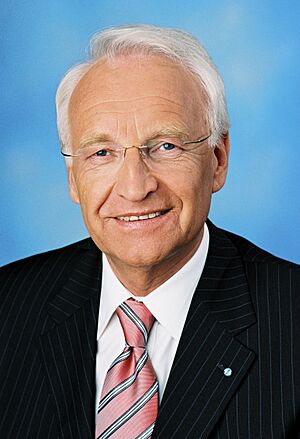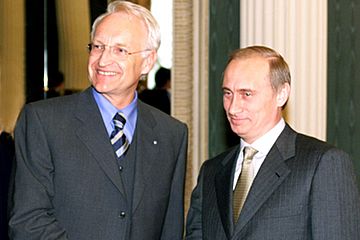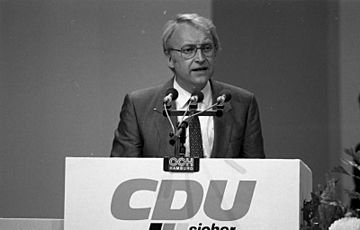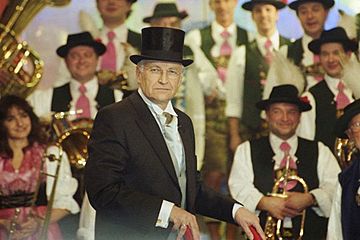Edmund Stoiber facts for kids
Quick facts for kids
Edmund Stoiber
|
|
|---|---|

Stoiber in 2010
|
|
| Leader of the Christian Social Union | |
| In office 9 October 1999 – 18 September 2007 |
|
| General Secretary | Thomas Goppel Markus Söder |
| Preceded by | Theo Waigel |
| Succeeded by | Erwin Huber |
| Minister-President of Bavaria | |
| In office 28 May 1993 – 30 September 2007 |
|
| Deputy | Hans Zehetmair Barbara Stamm Günther Beckstein |
| Preceded by | Max Streibl |
| Succeeded by | Günther Beckstein |
| President of the Bundesrat | |
| In office 1 November 1995 – 31 October 1996 |
|
| First Vice President | Johannes Rau |
| Preceded by | Johannes Rau |
| Succeeded by | Erwin Teufel |
| State Minister of the Interior of Bavaria | |
| In office 19 October 1988 – 17 June 1993 |
|
| Minister-President | Max Streibl |
| Preceded by | August Richard Lang |
| Succeeded by | Günther Beckstein |
| State Minister and Chief of the State Chancellery of Bavaria | |
| In office 27 October 1982 – 19 October 1988 |
|
| Minister-President | Franz Josef Strauß |
| Preceded by | Rainer Keßler |
| Succeeded by | Wilhelm Vorndran |
| Member of the Landtag of Bavaria for Bad Tölz-Wolfratshausen, Garmisch-Partenkirchen (Bad Tölz-Wolfratshausen; 1994–2003) (Miesbach; 1974–1994) |
|
| In office 12 November 1974 – 17 July 2008 |
|
| Preceded by | Anton Staudacher |
| Succeeded by | Martin Bachhuber |
| Personal details | |
| Born | 28 September 1941 Oberaudorf, Bavaria, Germany |
| Political party | Christian Social Union (1971–) |
| Spouse |
Karin Stoiber
(m. 1968) |
| Children | 3 |
| Residence | Wolfratshausen |
| Alma mater | Bavarian School of Public Policy Ludwig Maximilian University of Munich University of Regensburg (Dr. iur.) |
| Website |
|
Edmund Rüdiger Stoiber (born 28 September 1941) is a German politician. He was the 16th minister-president of the German state of Bavaria from 1993 to 2007. He also led the Christian Social Union (CSU) party from 1999 to 2007. In 2002, he ran to become the Chancellor of Germany. He lost in a very close election to Gerhard Schröder.
Contents
Early Life and Education
Edmund Stoiber was born in Oberaudorf, a town in Bavaria, Germany. Before he became a politician in 1974, he worked as a lawyer. He also worked at the University of Regensburg.
He went to the Ignaz-Günther-Gymnasium in Rosenheim. He finished high school in 1961. After that, he served in the military. He studied political science and law at the Ludwig-Maximilians-Universität München. He became a lawyer in 1967. Later, he earned a doctorate in law. In 1971, he joined the Bavarian State Ministry of Development and Environment.
Political Career
Edmund Stoiber started his political journey in the CSU party. In 1978, he became the party's secretary general. He held this important role until 1982 or 1983. During this time, he helped manage the election campaign for Franz-Josef Strauss. Strauss was the first Bavarian leader to try to become Chancellor of Germany in 1980.
From 1982 to 1986, Stoiber was a deputy to the Bavarian secretary of state. Then, he led the State Chancellery from 1982 to 1988. This office helps the Minister-President manage the state government. From 1988 to 1993, he served as the State Minister of the Interior. This role is like being the head of the state's police and security.
Leading Bavaria: Minister-President (1993–2007)
In May 1993, the Landtag of Bavaria, which is Bavaria's state parliament, chose Edmund Stoiber as their new Minister-President. He took over from Max Streibl. He became the leader during a time of political challenges. When he took office, he appointed Monika Hohlmeier, the daughter of Franz-Josef Strauss, as the State Minister for Education.
As Minister-President, Stoiber also served as the President of the Bundesrat in 1995 and 1996. The Bundesrat is a council where German states work together. In 1998, he also became the chairman of the CSU party, taking over from Theo Waigel.
During his 14 years as Bavaria's leader, the state became one of the richest in Germany. By 1998, under his leadership, Bavaria sold off over $3 billion worth of state-owned businesses. This money was then used to build new roads and other important structures. It also helped new companies get started. Stoiber was seen as a key person in making Bavaria one of Europe's strongest economies. He helped bring many high-tech, engineering, and media companies to the state. This also helped reduce unemployment to half of the national average.
Running for Chancellor (2002)
In 2002, Edmund Stoiber became the candidate for Chancellor for the CDU/CSU parties. He was chosen over Angela Merkel, who was the CDU chairwoman at the time. Many people thought Merkel was too new to lead the country. Stoiber was set to challenge the sitting Chancellor, Gerhard Schröder.
Before the 2002 national election, the CSU/CDU parties were far ahead in the polls. Stoiber famously said the election was like a "football match where it's the second half and my team is ahead by 2–0." However, things changed on election day. The SPD made a big comeback. The CDU/CSU lost by a very small margin. Both parties got 38.5% of the vote. The SPD won by only about 6,000 votes, getting 251 seats compared to the CDU/CSU's 248. This was one of the closest elections in modern German history.
Gerhard Schröder was re-elected as Chancellor. He formed a government with the Green Party. Many experts believed Stoiber's reaction to the 2002 European floods in eastern Germany hurt his chances. Also, Schröder strongly spoke out against the upcoming Iraq War. His strong stance on this issue was seen as a major reason why the SPD won the election.
Later Political Roles
After the 2002 election, Stoiber led the CSU to a huge victory in the 2003 Bavarian state election. For the third time in a row, the CSU won an absolute majority. They got 60.7% of the votes. This was the biggest win ever for a German party in any state election.
From 2003 to 2004, Stoiber helped lead a group that worked to reform how power was shared between the federal and state governments in Germany. In February 2004, he was considered for the presidency of the European Commission. This is a very important job in the European Union. However, he decided not to take the position.
Stoiber had hoped to run for Chancellor again. But Angela Merkel secured the nomination. She went on to win the general election in November 2005. Stoiber was expected to join Merkel's government as the Economics Minister. However, he decided to stay in Bavaria. He felt the new government setup was not right for him.
Criticism of Stoiber grew within his own party. On 18 January 2007, he announced he would step down as Minister-President and party chairman by 30 September. Günther Beckstein became the new Minister-President. Erwin Huber became the new party chairman. Both Beckstein and Huber resigned after the 2008 Bavarian state election. In that election, the CSU's votes dropped, and they had to form a coalition government for the first time since 1966.
Life After Politics
After leaving German politics in 2007, Edmund Stoiber became a special adviser to European Commission President José Manuel Barroso. He led a group focused on reducing rules and paperwork for businesses. This group was often called the "Stoiber Group." He continued this work until late 2015.
Since 2007, Stoiber has also worked as a lawyer. He holds various positions, both paid and unpaid. These include being on the board of trustees for the Bundesliga Foundation and the advisory board for Deloitte Germany. He is also a member of the supervisory board for FC Bayern Munich, a famous football club.
Political Views

Foreign Policy
As Minister-President, Stoiber traveled to many countries. He visited China, Israel, Egypt, India, and South Korea. In 2002, he supported the United States' approach to Iraq. He was against war but wanted weapons inspectors to go to Iraq. He also criticized German Foreign Minister Joschka Fischer for his strong criticism of the U.S. position.
Stoiber is known for having a good relationship with Vladimir Putin. Some people have compared him to Gerhard Schröder in this regard.
European Integration
Stoiber was cautious about Germany adopting the euro currency. In 1997, he suggested delaying Europe's currency union for five years. He also strongly opposed Turkey joining the European Union. He believed Turkey's culture was too different.
However, Stoiber has also said he is a "good European." He supports the idea of a common foreign policy for the EU. He also wants a single European army. In 1993, he said he wanted a "simple confederation." This means that individual countries would keep their main power, especially over their own internal matters.
Economic Policy
Stoiber is known for his conservative views on both money and social issues. This helped him gain support in Bavaria, where religious voters are strong. In 2005, he helped convince Novartis, a big Swiss drug company, to move its Sandoz headquarters to Munich. This was a big win for Bavaria's goal to become a center for pharmaceuticals and biotechnology.
While he was Minister-President, Stoiber pushed for a high-speed magnetic-levitation train link. This train would connect Munich's main station to its airport. The project was planned to be built by Transrapid International. However, after he left office, the German government stopped the plans in 2008. The costs had become too high.
Domestic Policy
Stoiber supported reducing the number of asylum seekers Germany accepted. This led some critics to call him anti-immigrant. In the late 1990s, he criticized Chancellor Gerhard Schröder for saying he would work for the interests of Germans and people living in Germany. Stoiber's comments caused a lot of discussion in the news.
In 1995, Germany's highest court ruled that a Bavarian law requiring a crucifix in every classroom was against the constitution. Stoiber said he would not immediately remove the crucifixes. He argued that schools did not have to remove them if all parents agreed to keep them.
During his 2002 election campaign, Stoiber said he would not ban same-sex marriages. The Schröder government had allowed these marriages. Stoiber had strongly disagreed with this policy when it was first introduced.
Media Policy
Stoiber strongly supported changes in German law to give more power to private TV channels. In 1995, he suggested getting rid of Germany's public television service, ARD. He wanted to simplify its regional services. However, when the European Commissioner for Competition suggested changes to how public broadcasters are funded, Stoiber was against them.
Personal Life
Edmund Stoiber is Roman Catholic. He is married to Karin Stoiber. They got married in 1968. They have three children: Constanze (born 1971), Veronica (born 1977), and Dominic (born 1980). They also have five grandchildren.
Stoiber is a big fan of football. When he was younger, he played for a local team called BCF Wolfratshausen. He is a member of the Supervisory Board of FC Bayern München AG. He also chairs the Administrative Advisory Board of FC Bayern Munich e.V.
Before the 2002 election, Uli Hoeneß, the general manager of FC Bayern, publicly supported Stoiber and the CSU. Football legend Franz Beckenbauer also showed his support. He let Stoiber join the Germany national football team on their flight home after the 2002 FIFA World Cup.
Honours and Awards
- 1984: Bavarian Order of Merit
- 1996: Karl Valentin Order
- 1996: Grand Order of King Dmitar Zvonimir
- 1999: Grand Cross of the Order of the Star of Romania
- 2000: Orden wider den tierischen Ernst
- 2002: Commander of the Legion of Honour
- 2003: Officer of the Ordre national du Québec
- 2004: Grand Cross of the Order of Merit of the Federal Republic of Germany
- 2005: Grand Decoration of Honour in Gold with Sash for Services to the Republic of Austria
- 2006: Grand Cross of Order of Merit of the Italian Republic
- 2007: Large Gold Medal of the province of Upper Austria
- 2007: Honorary degree awarded by the Sogang University
- 2008: Steiger Award
- 2009: Order of Merit of Baden-Württemberg
See also
 In Spanish: Edmund Stoiber para niños
In Spanish: Edmund Stoiber para niños
- List of minister-presidents of Bavaria
 | Audre Lorde |
 | John Berry Meachum |
 | Ferdinand Lee Barnett |



